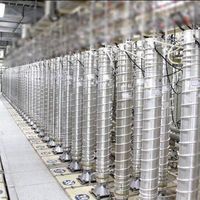Debate Intensifies Over Ex-President’s Role In Upcoming Iranian Elections
Three months before the controversial elections in Iran, discussions in Tehran are focused on the role of former President Hassan Rouhani and its potential impact.
The upcoming vote on March 1 will determine a new parliament and members of the Assembly of Experts (AoE), responsible for selecting a Supreme Leader after the death of Ali Khamenei. However, the interior ministry, controlled by hardliners, has already disqualified numerous sitting lawmakers from seeking re-election, intensifying the controversy surrounding the restricted elections.
Although the official results of the vetting of the AoE candidates are not yet out, Rouhani's supporters seem to be certain about the endorsement of his qualifications, while his hardliner opponents would like to see him barred. Some others have gone out of their ways to spread fake news about his disqualification or even his death on social media.
Rouhani's recent comments about the elections has convinced many political observers that he is adamant to play a key role in the upcoming elections. The former president known as a pragmatist opposed to hardliners argued that the composition of the next AoE is important because it will have do decide about Supreme Leader’s succession.
Rouhani's comments triggered a series of harsh reactions on the part of hardline media including the Kayhan, which is close to Khamenei's office, and Raja News linked to ultraconservative Paydari Party, i.e., Rouhani's arch opponent.
The website wrote that even if all the moderate and pro-reform candidates in parliamentary and AoE elections are disqualified, still approval of Rouhani’s candidacy will lead to a bipolar situation in the elections. No other figure in the moderate camp can usher likeminded candidates into the parliament or the Assembly of Experts, the website wrote, adding that nonetheless, it is difficult to predict the Guardian Council's decision about Rouhani's qualifications.
To shed light on the importance of Rouhani as a charismatic figure in the moderates' camp, Mahmoud Alizadeh Tabatabaei, a spokesman for the Executives of Construction Party, the leading moderate and pro-reform party has said that the centrist group will support the list of candidates that Rouhani would back. This is a centrist party with Rouhani's closest allies and technocrats such as Mohammad Bagher Nobakht and Es'haq Jahangiri at the helm.
It is the first time that between the two centrist parties, both created by former President Akbar Rafsanjani's aides, Rouhani’s Moderation and Development party will take the lead and the Executives of Construction will follow.
Nevertheless, Alizadeh suggested that the entrenched core of regime insiders is unlikely to permit the emergence of a robust minority faction in the upcoming parliament. He contended that the hardliners have effectively strengthened their control to the extent that even some within their own ranks may struggle to secure seats in the next parliamentary session and assembly.
Meanwhile, pro-reform daily Arman-e Melli warned hardliners in a commentary on Monday that "disqualifying Rouhani will be costly for you, not for him." The daily added: "You cannot send him to the country's political parking area."
Arman-e Melli reported that hardliners are actively seeking Rouhani's disqualification, employing mosques, podiums, and meetings to rally against him, aiming to erase him from the Iranian political landscape. They are determined to convey to Rouhani that his era of political influence is over, urging him to retreat into isolation at home.
Conversely, Rouydad24 highlighted that Hassan Rouhani stands out as the most recognizable candidate for the Assembly of Experts elections, surpassing other candidates in terms of public familiarity. Despite facing criticism, especially for perceived shortcomings in controlling economic challenges, his strong presence on social media remains a significant advantage. The platform noted that this popularity on social media could enhance his chances of securing public support.
Nevertheless, asserting that the people will have the decisive influence in Iranian elections remains challenging.







